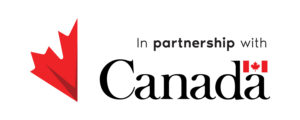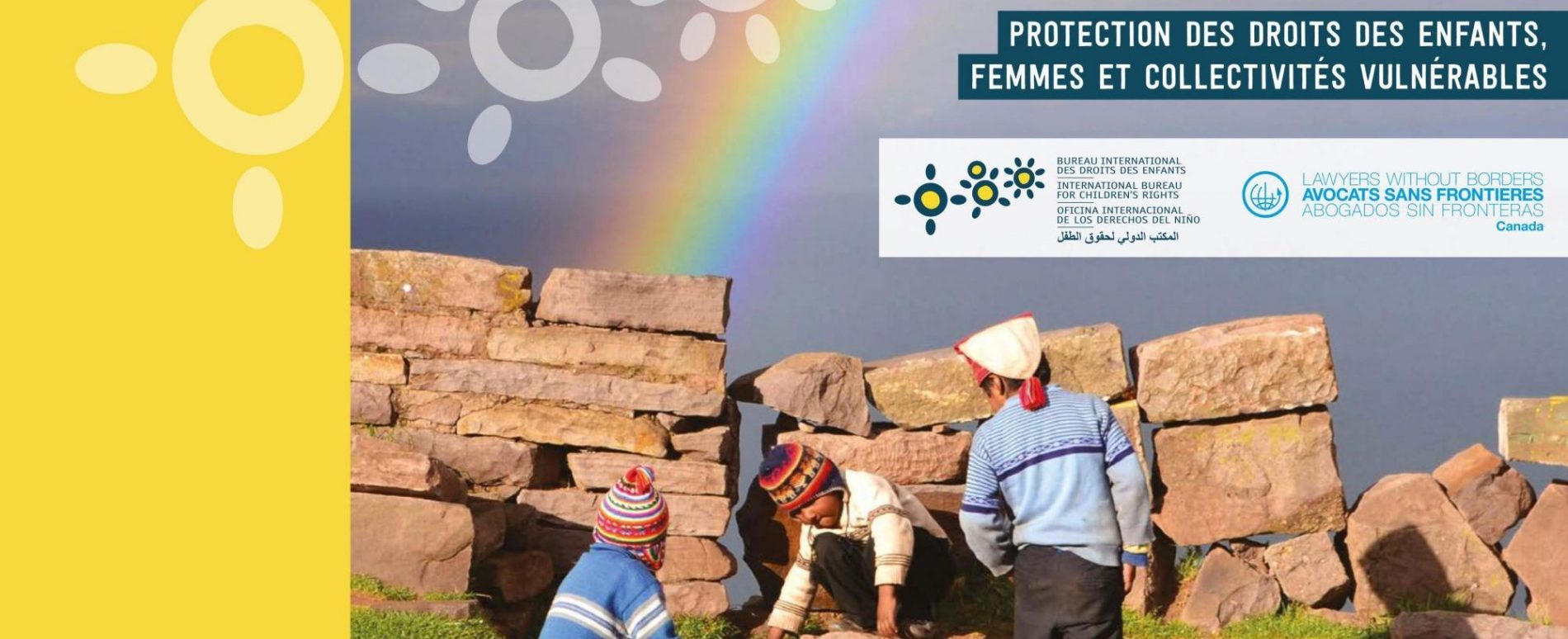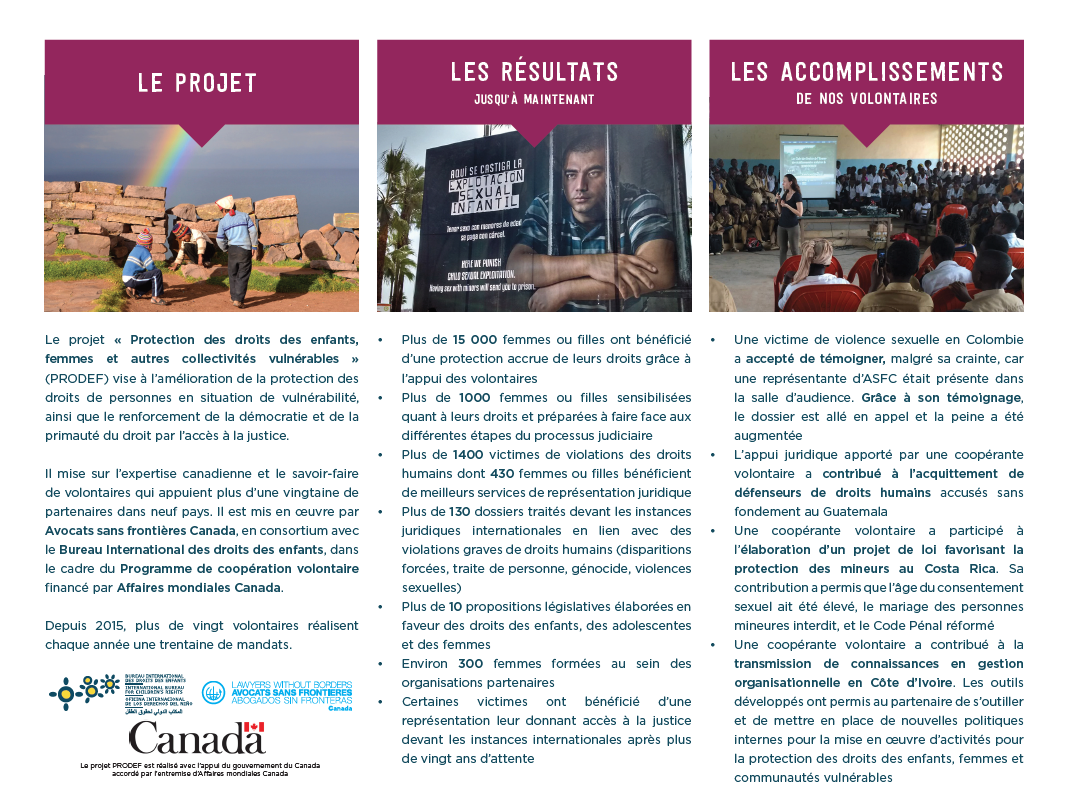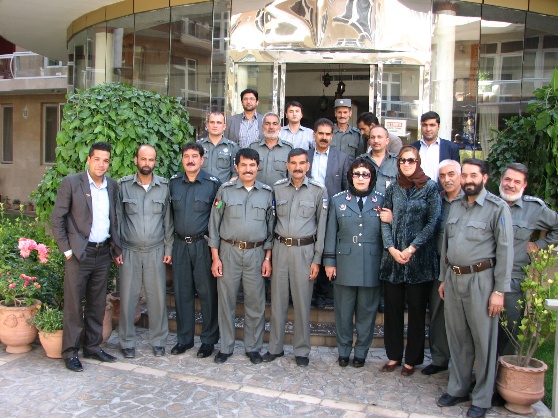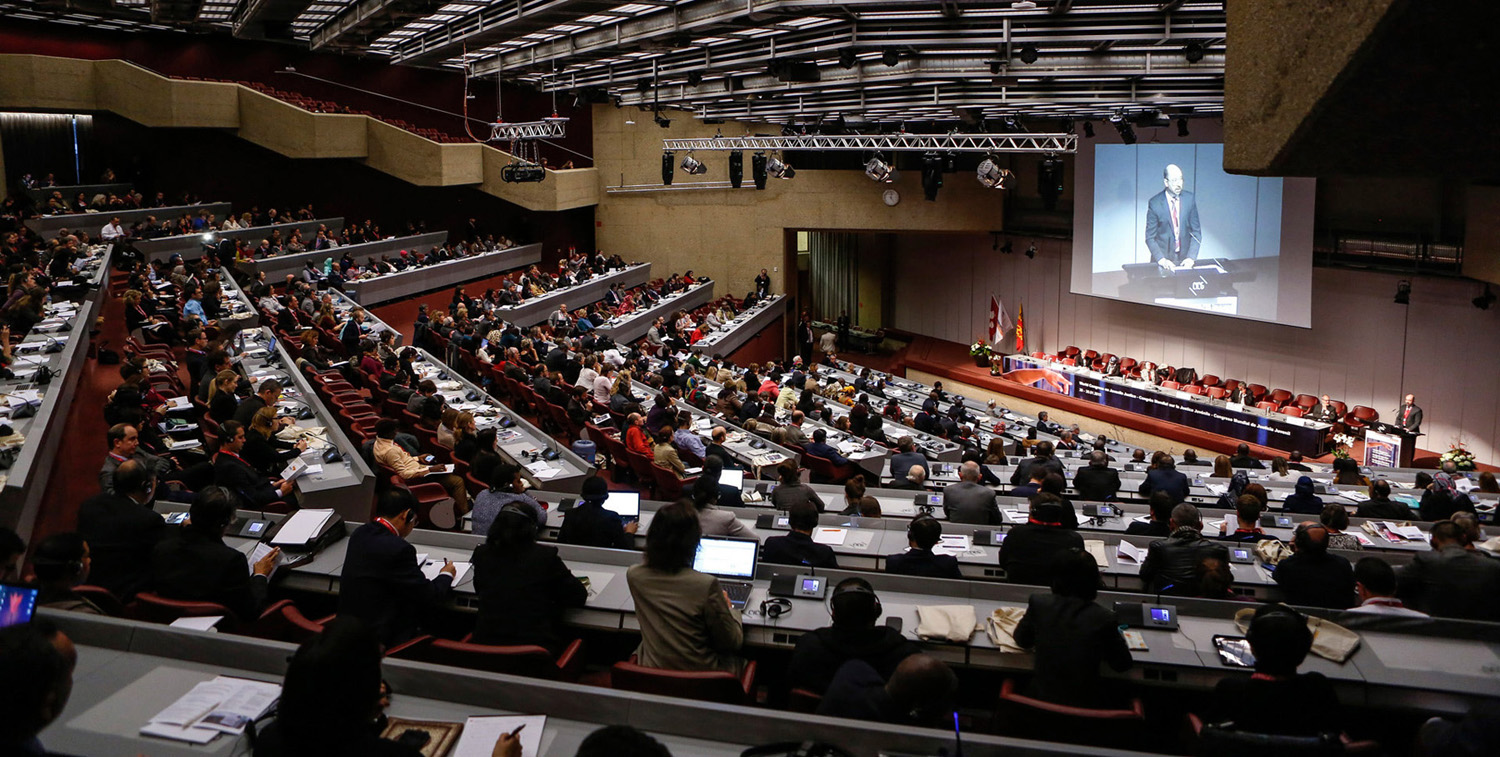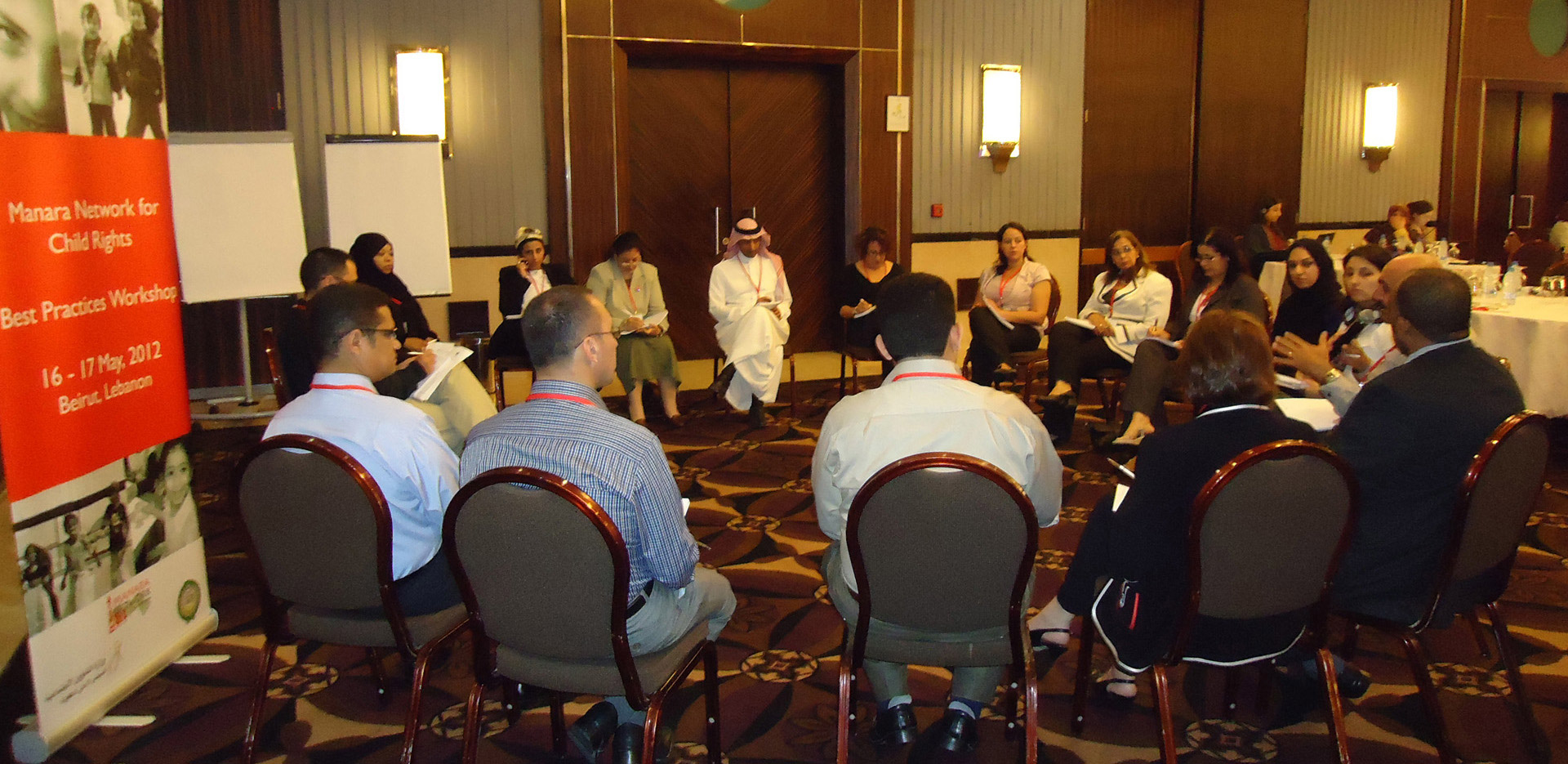Voluntary Cooperation Programme: Protection of the rights of children, women and vulnerable communities (PRODEF) – Colombia
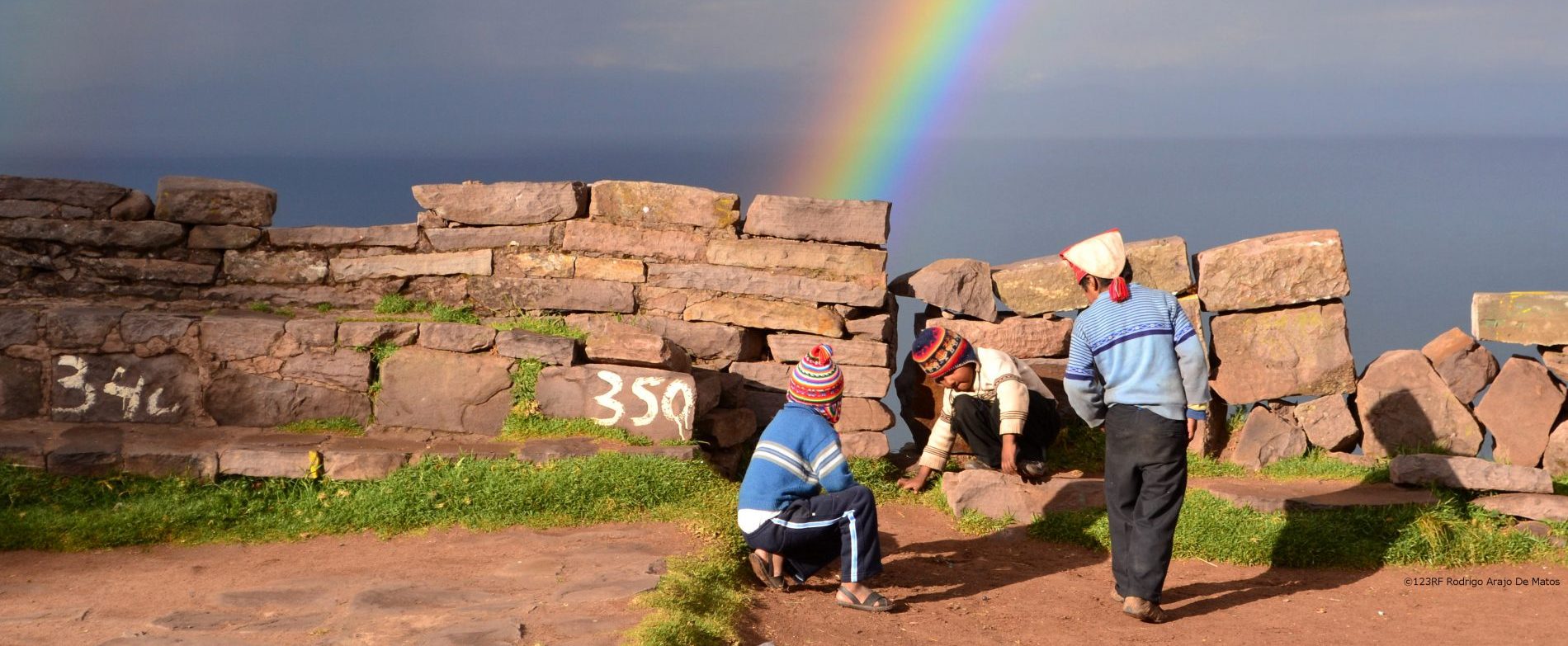
Giving your energy and knowledge to work that can have a direct impact on the lives of the most vulnerable people in society is an invaluable experience that transcends our own professional development.
<span class="su-quote-cite">Claudia Nuñez, Volunteer legal advisor at the CHS Alternativo Association.</span>
Duration of the project : 2015 - 2020
In 2014, Global Affairs Canada launched a call for proposals for the renewal of the Voluntary Cooperation Program (VCP), opening the program to new Canadian organisations. It was in this context that the consortium formed by Lawyers Without Borders Canada (LWBC) and IBCR submitted its five-year Protection of the Rights of Children, Women and Vulnerable Communities (PRODEF) project. Approved in May 2015 by the Canadian government, the programme was implemented in the summer of that year.
Our objectives
PRODEF was the first project of its kind carried out by the IBCR and aimed to improve the protection of the rights of children, women and communities in situations of poverty or marginalisation. It also aimed to strengthen democracy and improve access to justice in the countries concerned. The project sought to address important challenges, such as insufficient protection of children's rights, impunity, unequal enjoyment of rights and discriminatory practices, limited access to justice, corruption, etc.
To this end, Canadians were deployed to provide specialised technical skills and methodologies (in law, communication, social work or organisational management) to partner organisations to support the prevention, promotion, protection and defence of human rights in the countries concerned. During their stay, which can last from two weeks to several months, volunteers contribute their knowledge and skills to the work of the partner organisations.
This programme allows Canadians to gain a unique experience and subsequently contribute to raising public awareness of international cooperation and issues related to the rights of women, children and vulnerable communities.
Between 2015 and 2020, more than 70 volunteers have been deployed by the CBSA-IBCR consortium within partner organisations in 9 countries (Colombia, Costa Rica, Ivory Coast, Guatemala, Haiti, Honduras, Morocco, Peru, Tunisia). They have improved the situation of thousands of women, children and young people from marginalised communities by strengthening their rights and their access to justice.
26 development workers were deployed by the IBCR, for a total of 36 mandates.
Realisations
During the 5 years of the project, the Office and its consortium partner were able to achieve the following results:
- Increased protection of the rights of 24,906 people, including 4,128 women and 17,221 children, through the support of volunteers
- 9,207 people made aware of their rights, including 5,194 women and girls
- Improved legal representation for more than 4,186 victims of human rights violations, including 2,126 women and girls
- More than 300 cases dealt with before international bodies in relation to serious human rights violations (enforced disappearances, human trafficking, genocide and sexual violence...)
- More than 31 legislative proposals drawn up in favour of the rights of children, young people and women;
- Approximately 1,808 people, including 858 women, trained within partner organisations
Examples of the contribution of development workers in Colombia
Our partner in Colombia : Coalition against the Use and Recruitment of Children in the Colombian Armed Conflict (COALICO)
- Contribution to the drafting of the bill creating the "Special Jurisdiction for Peace", approved in March 2017, which allows the creation of an integral system of truth, justice, reparation and non-repetition.
- Deepening the partner organisation's knowledge of the situation of children in post-conflict society, strengthening its advocacy capacities to positively transform situations generated by armed conflict for children, and enabling the holding of several workshops with communities and groups of adolescents to raise awareness of children's rights in the context of armed conflict.
- Establishment of a dialogue with government institutions and authorities in the border region of Colombia and Venezuela on the situation and consequences of forced displacement for children and adolescents in the process of return and relocation.
This project was carried out with the financial support of :
- Intervention locations : 9 countries taking part in the project: Colombia, Costa Rica, Côte d'Ivoire, Guatemala, Haiti, Honduras, Morocco, Peru and Tunisia,
- Project duration: 2015 - 2020
- Partners :
- World Affairs Canada, Lawyers Without Borders Canada, Amal pour la Famille et l'Enfant (Tunisia), Association Bayti (Morocco), Asociación Pro Derechos Humanos (Peru), Association des Femmes Juristes de Côte d'Ivoire, ASFC Colombia (Colombia), ASFC Guatemala (Guatemala), Bufete de derechos humanos (Guatemala), Centre for Research and Promotion of Human Rights (Honduras), CIPRODEH (Honduras), COFADEH (Honduras), Centro para la Acción Legal en Derechos Humanos (Guatemala), CHS Alternativo (Peru), Collectif contre l'impunité (Haiti), Office de la protection du Citoyen (Haiti), Comité de Familiares de Detenidos - Desaparecidos en Honduras, Corporación Humanas (Colombia) Fundación Paniamor (Costa Rica), Instituto Promoviendo Desarrollo Social (Peru), Kay Fanm -with MOUFHED and SOFA (Haiti).
- Highlights:
- 110 voluntary cooperation mandates, including 41 IBCR mandates
- 9 beneficiary countries
- 28 partners
- A dedicated website: http://www.cooperationvolontaireasfcibcr.com/
- Better protection of the rights of 24,906 people, including 4,128 women and 17,221 children, as a result of volunteer support
- 9,207 people made aware of their rights, including 5,194 women and girls
- Improved legal representation for over 4,186 victims of human rights violations, including 2,126 women or girls
- More than 300 cases dealt with before the legal authorities in relation to serious human rights violations (disappearances, trafficking in persons, genocide, sexual violence, etc.)
- 31 legislative proposals developed for the rights of children, adolescents and women
- More than 350 workshops organised
- Over 1,800 people, including 858 women, trained in partner organisations
- Fields of activity and expertise :
- Capacity building
- Advocacy and institutional support
- Tools, reference manuals and standards
- Training leadership
- Children in emergency situations
- Child sexual exploitation
- Violence against children
- Child protection systems
- Children and the justice system






